外研版(2019) 选择性必修 第一册 Unit 2 Onwards and upwards课件(20张PPT)
文档属性
| 名称 | 外研版(2019) 选择性必修 第一册 Unit 2 Onwards and upwards课件(20张PPT) | 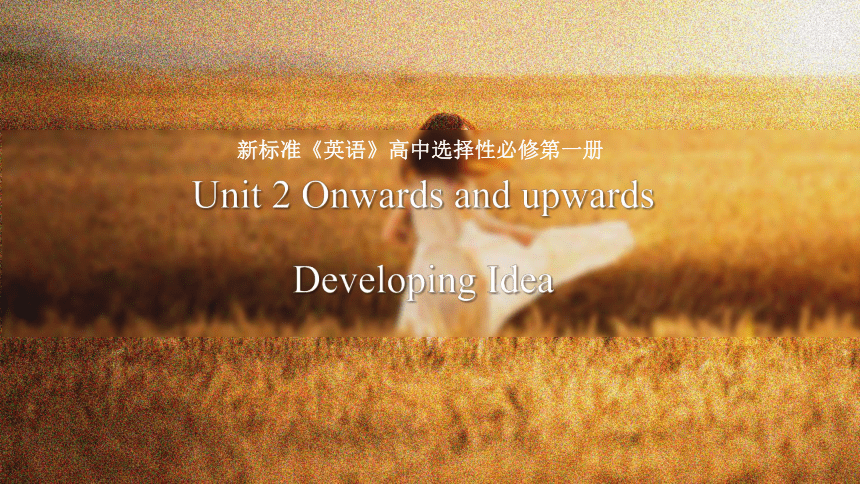 | |
| 格式 | pptx | ||
| 文件大小 | 9.3MB | ||
| 资源类型 | 教案 | ||
| 版本资源 | 外研版(2019) | ||
| 科目 | 英语 | ||
| 更新时间 | 2023-09-21 18:09:13 | ||
图片预览

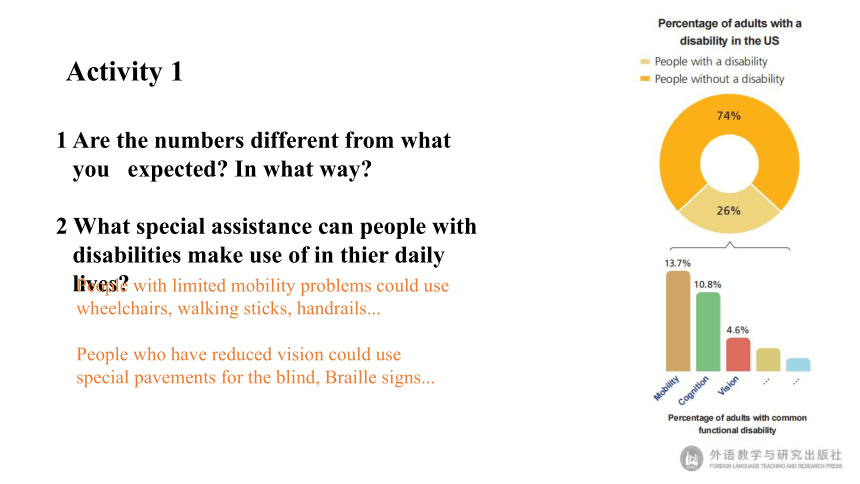


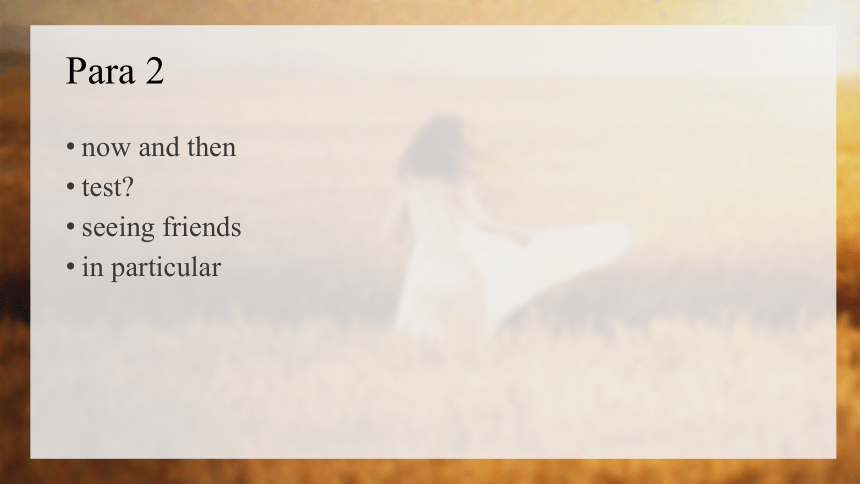

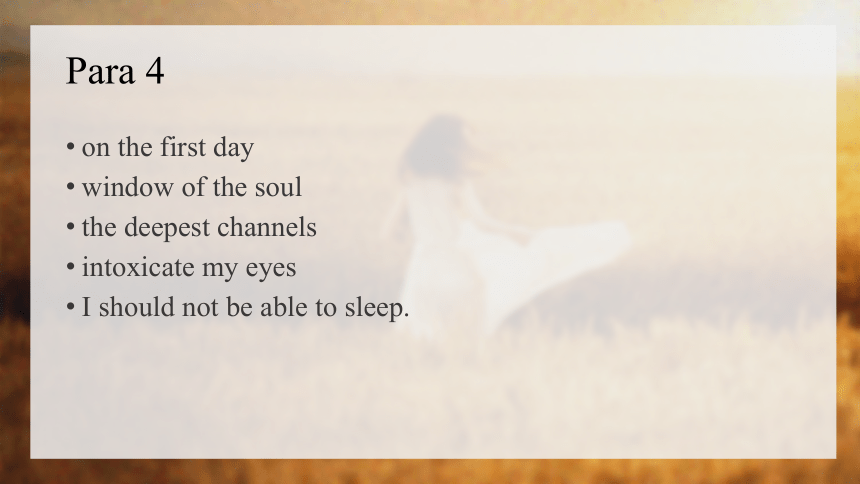
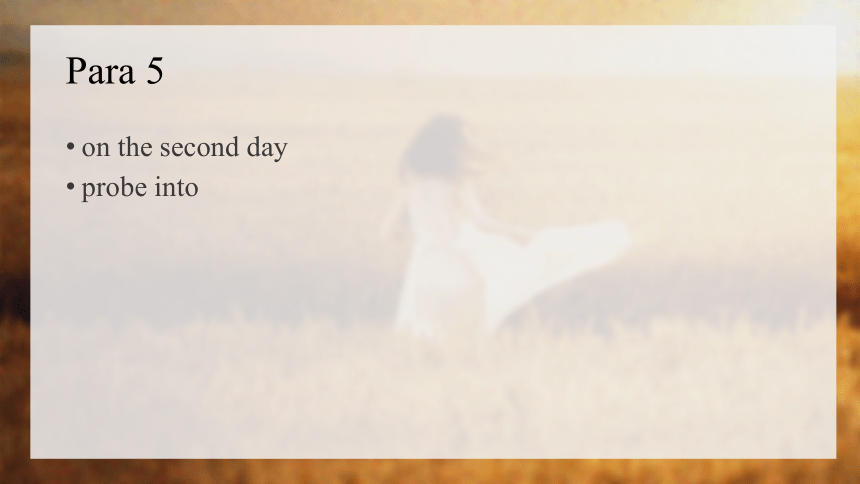
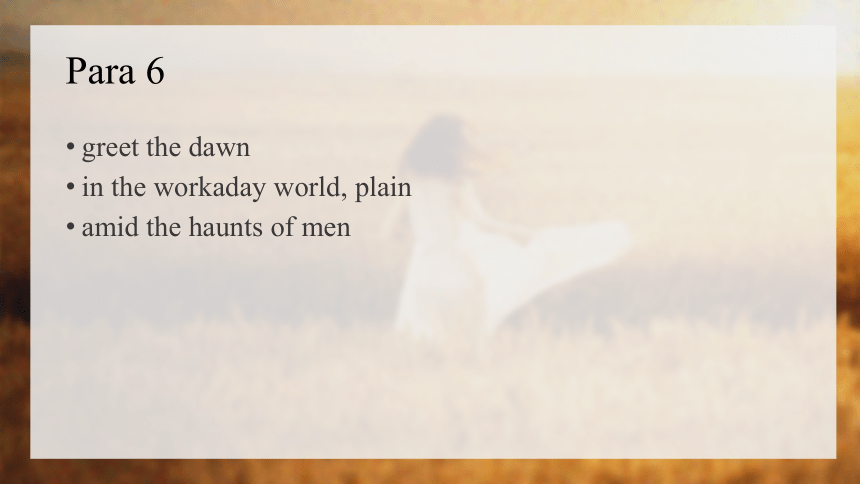
文档简介
(共20张PPT)
Unit 2 Onwards and upwards
Developing Idea
新标准《英语》高中选择性必修第一册
Activity 1
1 Are the numbers different from what you expected In what way
2 What special assistance can people with disabilities make use of in thier daily lives
People with limited mobility problems could use
wheelchairs, walking sticks, handrails...
People who have reduced vision could use
special pavements for the blind, Braille signs...
Activity 2
While reading
Find out what the author would do if she could see.
Before reading
Share the information of the life and achievement of Helen Keller.
Para 1
human being
were stricken blind and deaf
Para 2
now and then
test
seeing friends
in particular
Para 3
how was it possible
worthy of note
by
Para 4
on the first day
window of the soul
the deepest channels
intoxicate my eyes
I should not be able to sleep.
Para 5
on the second day
probe into
Para 6
greet the dawn
in the workaday world, plain
amid the haunts of men
Para 7
Only when darkness had again descended upon me should I realize how much I had left unseen.
Para 8
be stricken blind
be stricken deaf
be applied to
tactile sense = feel
On the first day, she would want to see the kind people who have helped her and accompanied her through life. Then she would like to see the books which have opened her mind. In the afternoon, she would take a long walk in the woods and appreciate the beauty of nature.
On the second day, she would like to see a display of the progress of civilisation. She would go to the museums and spend the evening at a theatre or at the movies.
On the third day, she would again greet the dawn, anxious to discover new delights, new revelations of beauty. She will spend the third day observing people in their day-to-day life.
Activity 3
1 To help readers understand what it is like to be blind.
2 To make readers without disabilities appreciate what they have.
3 To persuade readers to care about the blind.
Choose the author’s purpose and give your reasons.
At the start of the passage, the author said it would be a blessing if each human being were stricken blind and deaf for a few days at some time during his early adult life. Darkness would make them more appreciative of sight; silence would teach him the joys of sound.
Think & Share
1 What are the main wishes of the author Give an example.
2 Do you know of any stories about people with disabilities Share one with the class.
3 How should we interact with people with disabilities
4 What qualities do both reading passages in this unit convey
1 The author would like to be able to see for three days. She would like to be able to see the people who have helped her and with whom she spends her time. she would like to see the books she has read.
4 Facing difficulties and setbacks in life with a positive attitude
Activity 4
1 What sentence structure is used repeatedly What figure of speech is it
A similar structure is used repeatedly. Namely, “Use… as if… Hear... as if... Touch... as if...”. It is parallelism.
2 How does this technique help to express the author’s emotions
Read the sentences and answer the questions.
The use of parallelism in speech or writing allows speakers or writers to maintain a consistency within their work and creates a balanced flow of ideas. Moreover, parallelism can be used as a tool for persuasion.
Activity 5
Give a talk.
Orgnise your talk and make notes.
Do you agree
Activity 6
1 Why did the author go to the “dark restaurant”
Because the author wanted to understand the experience of being blind, thinking eating would be the most difficult activity.
2 What difficulties did the author have during the meal
① The author knocked over glasses and dropped food.
② The author ate much more slowly, trying to guess what was being eaten.
③ Pouring water was very difficult.
④ After failing to pick up any food with a fork for five minutes, the author decided to use hands,
but stuck one hand into a bowl of warm, thick soup.
⑤ Even using a spoon, most of the soup ended up on the author’s shirt.
3 How did the author feel after finishing the meal
Read the passage and answer the questions.
The author left the restaurant feeling hungry, though much more aware of the challenges that blind people face.
Activities 7-8
Experience the lives of the disabled.
Write a short passage to describe your experience.
Activities 7-8
Work in pairs. Make improvements to each other’s passages and share them with the class.
Today in class, we played a game called “the blind traveller”, in which one has to walk through some barriers with his eyes blindfolded. It is through this experience that I started to realise how inconvenient life could be for a blind person.
Not being able to see where I was going, I kept going off the path and turning in the wrong direction. What’s more, without the ability to accurately locate the position of the barriers, I often fell over them, even though I was moving at an extremely slow speed. And a loss of balance increased the difficulty of this short journey. After falling over more than ten times, I finally reached my destination on hands and knees.
Without sight, I couldn't even complete this short journey of no more than 15 metres smoothly, let alone overcome all the other various difficulties in daily life. I do realise that life must be much more challenging for the blind people.
Activities 7-8
Work in pairs. Make improvements to each other’s passages and share them with the class.
Last winter holiday, my left leg was injured in a car accident, and for nearly one month I had to rely on crutches. It is through that experience that I started to realise how inconvenient life could be for a person with reduced mobility.
It took me much effort to adapt to walking with crutches on the flat ground. And it was even more painful to walk upstairs with them. Eventually, after a few days’ practice, I could go up and down stairs quite easily. But the difficulty which I failed to overcome was when standing up on a crowded bus. My loss of balance and the sudden stopping and starting of the bus often made me fall over.
One month in my life without the full use of both my legs was so difficult, it really made me appreciate the challenges of those for whom reduced mobility is permanent.
Unit 2 Onwards and upwards
Developing Idea
新标准《英语》高中选择性必修第一册
Activity 1
1 Are the numbers different from what you expected In what way
2 What special assistance can people with disabilities make use of in thier daily lives
People with limited mobility problems could use
wheelchairs, walking sticks, handrails...
People who have reduced vision could use
special pavements for the blind, Braille signs...
Activity 2
While reading
Find out what the author would do if she could see.
Before reading
Share the information of the life and achievement of Helen Keller.
Para 1
human being
were stricken blind and deaf
Para 2
now and then
test
seeing friends
in particular
Para 3
how was it possible
worthy of note
by
Para 4
on the first day
window of the soul
the deepest channels
intoxicate my eyes
I should not be able to sleep.
Para 5
on the second day
probe into
Para 6
greet the dawn
in the workaday world, plain
amid the haunts of men
Para 7
Only when darkness had again descended upon me should I realize how much I had left unseen.
Para 8
be stricken blind
be stricken deaf
be applied to
tactile sense = feel
On the first day, she would want to see the kind people who have helped her and accompanied her through life. Then she would like to see the books which have opened her mind. In the afternoon, she would take a long walk in the woods and appreciate the beauty of nature.
On the second day, she would like to see a display of the progress of civilisation. She would go to the museums and spend the evening at a theatre or at the movies.
On the third day, she would again greet the dawn, anxious to discover new delights, new revelations of beauty. She will spend the third day observing people in their day-to-day life.
Activity 3
1 To help readers understand what it is like to be blind.
2 To make readers without disabilities appreciate what they have.
3 To persuade readers to care about the blind.
Choose the author’s purpose and give your reasons.
At the start of the passage, the author said it would be a blessing if each human being were stricken blind and deaf for a few days at some time during his early adult life. Darkness would make them more appreciative of sight; silence would teach him the joys of sound.
Think & Share
1 What are the main wishes of the author Give an example.
2 Do you know of any stories about people with disabilities Share one with the class.
3 How should we interact with people with disabilities
4 What qualities do both reading passages in this unit convey
1 The author would like to be able to see for three days. She would like to be able to see the people who have helped her and with whom she spends her time. she would like to see the books she has read.
4 Facing difficulties and setbacks in life with a positive attitude
Activity 4
1 What sentence structure is used repeatedly What figure of speech is it
A similar structure is used repeatedly. Namely, “Use… as if… Hear... as if... Touch... as if...”. It is parallelism.
2 How does this technique help to express the author’s emotions
Read the sentences and answer the questions.
The use of parallelism in speech or writing allows speakers or writers to maintain a consistency within their work and creates a balanced flow of ideas. Moreover, parallelism can be used as a tool for persuasion.
Activity 5
Give a talk.
Orgnise your talk and make notes.
Do you agree
Activity 6
1 Why did the author go to the “dark restaurant”
Because the author wanted to understand the experience of being blind, thinking eating would be the most difficult activity.
2 What difficulties did the author have during the meal
① The author knocked over glasses and dropped food.
② The author ate much more slowly, trying to guess what was being eaten.
③ Pouring water was very difficult.
④ After failing to pick up any food with a fork for five minutes, the author decided to use hands,
but stuck one hand into a bowl of warm, thick soup.
⑤ Even using a spoon, most of the soup ended up on the author’s shirt.
3 How did the author feel after finishing the meal
Read the passage and answer the questions.
The author left the restaurant feeling hungry, though much more aware of the challenges that blind people face.
Activities 7-8
Experience the lives of the disabled.
Write a short passage to describe your experience.
Activities 7-8
Work in pairs. Make improvements to each other’s passages and share them with the class.
Today in class, we played a game called “the blind traveller”, in which one has to walk through some barriers with his eyes blindfolded. It is through this experience that I started to realise how inconvenient life could be for a blind person.
Not being able to see where I was going, I kept going off the path and turning in the wrong direction. What’s more, without the ability to accurately locate the position of the barriers, I often fell over them, even though I was moving at an extremely slow speed. And a loss of balance increased the difficulty of this short journey. After falling over more than ten times, I finally reached my destination on hands and knees.
Without sight, I couldn't even complete this short journey of no more than 15 metres smoothly, let alone overcome all the other various difficulties in daily life. I do realise that life must be much more challenging for the blind people.
Activities 7-8
Work in pairs. Make improvements to each other’s passages and share them with the class.
Last winter holiday, my left leg was injured in a car accident, and for nearly one month I had to rely on crutches. It is through that experience that I started to realise how inconvenient life could be for a person with reduced mobility.
It took me much effort to adapt to walking with crutches on the flat ground. And it was even more painful to walk upstairs with them. Eventually, after a few days’ practice, I could go up and down stairs quite easily. But the difficulty which I failed to overcome was when standing up on a crowded bus. My loss of balance and the sudden stopping and starting of the bus often made me fall over.
One month in my life without the full use of both my legs was so difficult, it really made me appreciate the challenges of those for whom reduced mobility is permanent.
